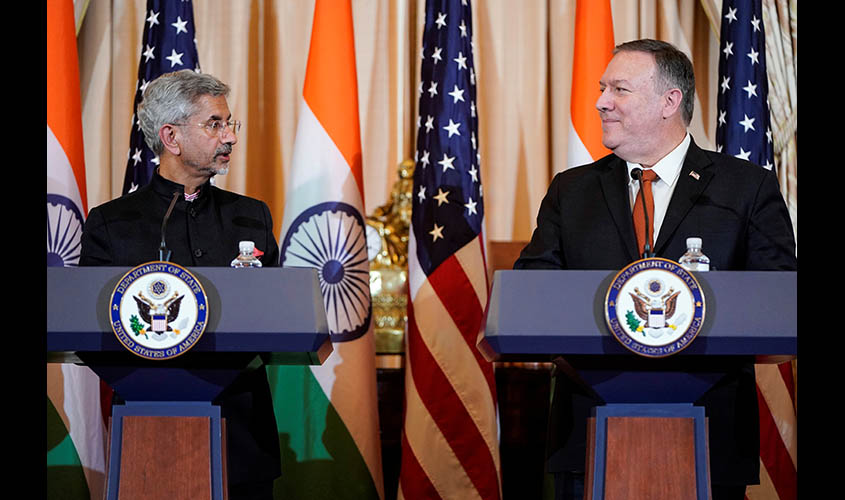Mutual concern regarding multi-faceted authoritarian challenge posed by Beijing is manifest throughout it.
Washington, DC: The United States and India convened a 2+2 Ministerial Dialogue in Washington this week, releasing a substantive joint statement and signing a number of significant agreements that will deepen a defence partnership vital to both countries. These concrete steps represent essential progress in building the US-India strategic partnership necessary to deter aggression by the Chinese Communist Party (CCP).
The joint declaration does not mention China, but the Sino-subtext runs throughout the document. While Pakistan and terrorism top New Delhi’s list of security concerns, Beijing’s growing political, military, informational and economic power represents a leading shared motivation for the deepening ties between Washington and New Delhi. Additionally there is concern in New Delhi that Beijing, as Pakistan’s leading patron, turns a blind eye to terrorist activity directed at India.
Mutual concern regarding the multi-faceted authoritarian challenge posed by Beijing is manifest throughout the declaration. The first paragraph highlights shared “democratic values”, which explicitly include “freedom, justice, human rights, and commitment to the rule of law”.
This is in stark contrast with a CCP that maintains its authoritarian monopoly on power at home through surveillance and oppression, while extending its power abroad through bullying, corruption and subterfuge.
Undoubtedly, both the US and India sometimes struggle to live up to their ideals. Nonetheless, these values serve as a touchstone and guidepost for constitutional democratic governments that derive their power from their citizens and can self-correct when they fall short.
American and Indian shared democratic values lead naturally to shared national security interests. The declaration reiterates the commitment of two of the world’s great democracies to a “free, open, inclusive, peaceful
The declaration reiterates support for important diplomatic and military initiatives. These include growing trilateral cooperation between the US, India, and Japan, as well as quadrilateral cooperation that adds Australia. A partnership between those four democracies that is diplomatically unified and militarily capable would represent the worst nightmare for the People’s Liberation Army and the best deterrent to additional Chinese aggression.
Reflecting India’s status as a Major Defense Partner of the US, the declaration says the two countries share a desire “to build a comprehensive, enduring, and mutually beneficial defense partnership and to expand all aspects of their security and defense cooperation”.
These are not just vacuous diplomatic pronouncements; the two governments are backing these pronouncements with specific and substantive action.
Combined maritime operations, for example, include “growing and increasingly sophisticated cooperation between their two Navies” in the Malabar exercise, as well as making the tri-service amphibious Tiger Triumph exercise an annual event.
The declaration also reaffirms a commitment to build cooperation between the respective Armies, Air Forces, and Special Operations forces. Accordingly, the Military Cooperation Group will perform annual reviews in search of new opportunities.
Perhaps most importantly, the US and India signed an Industrial Security Annex (ISA) and a number of Defense Technology and Trade Initiative (DTTI) documents. The ISA will foster the exchange of classified information between the defence industries in both countries.
For their part, the DTTI documents that Under Secretary of Defense for Acquisition and Sustainment Ellen Lord and Indian Secretary for Defence Production Subhash Chandra signed include an Industry Collaboration Forum agreement, a Standard Operating Procedure, and a Statement of Intent (SOI).
Notably, the SOI declared a joint intent to achieve “measureable progress” on several specific projects, including “Lightweight Small Arms Technologies and Air-Launched Small Unmanned Aircraft Systems, and Intelligence, Surveillance, Target Acquisition and Reconnaissance”.
Fostering strong alternate centres of power in the Indo-Pacific that can push back against Beijing’s belligerence serves US interests and promotes regional security. But as with all agreements and commitments, implementation and follow-up will be key.
A top US priority must be ensuring that US defence innovations do not find their way to Moscow or Beijing. In particular, Washington should foster a shared understanding with New Delhi regarding Beijing’s policy of “military-civil fusion.” Absent a shared understanding regarding Beijing’s stratagems, the CCP will continue to obtain military technology utilising seemingly innocent civilian methods.
Thus far, the Indians have been responsive to this genuine American concern, but continued vigilance is necessary.
New Delhi has been less responsive to Washington’s concerns related to India’s troubling and short-sighted acquisition of the Russian S-400 air defence system.
In great democracies like the US and India, however, leaders, parties, crises, and challenges come and go. Any successful long-term strategy for deterring the CCP’s aggression will require a sustainable, systemic, deep, and effective defence partnership between Washington and New Delhi. This week’s joint declaration and agreements take a significant step in making that aspiration a reality.
Bradley Bowman is senior director for the Center on Military and Political Power at the Foundation for Defense of Democracies, where Cleo Paskal is a non-resident senior fellow for the Indo-Pacific.

